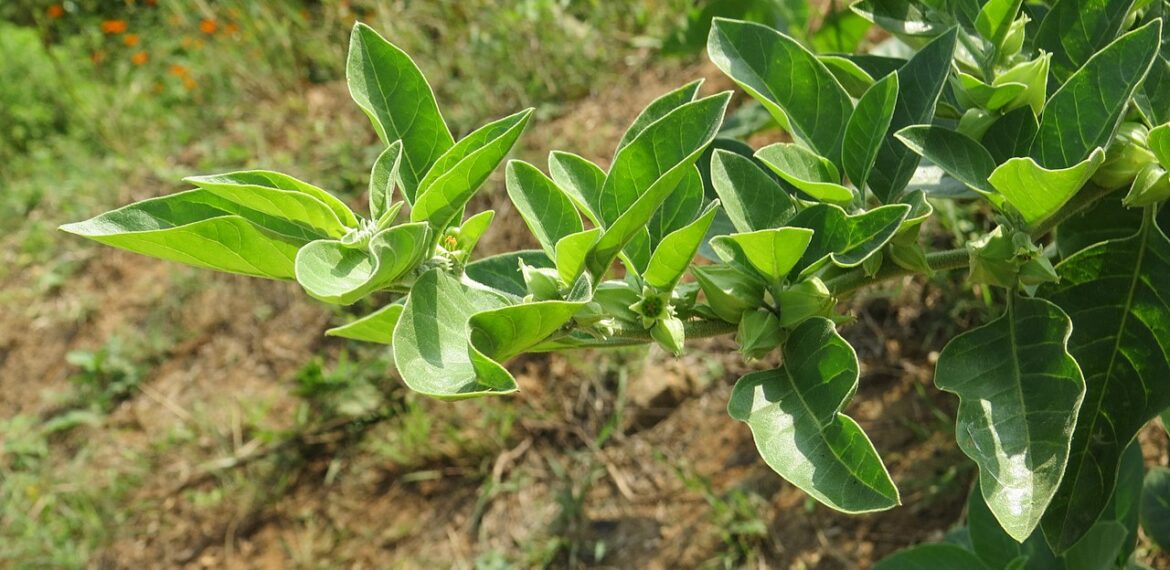Identification
Ashwagandha (Withania somnifera) is a small shrub with small green flowers and orange-red fruit that grows in India, the Middle East, and parts of Africa. Here are some key features to help identify an Ashwagandha plant:
- Leaves: Ashwagandha leaves are oval-shaped, about 10 cm long and 6 cm wide. They are a dull green color and have a slightly hairy texture.
- Stem: Ashwagandha stems are woody, light brown in color, and have a knotty texture.
- Flowers: Ashwagandha flowers are small, greenish-yellow, and bell-shaped. They bloom in clusters and have a slightly unpleasant odor.
- Fruit: Ashwagandha fruit is small, round, and orange-red in color. They are about the size of a raisin and have a slightly bitter taste.
- Height: Ashwagandha plants can grow up to 1.5 meters tall.
Below are some of the parts of the Ashwagandha plant that are commonly used for medicinal purposes:
- Roots – The roots of the Ashwagandha plant are the most commonly used part for medicinal purposes. They are used to prepare traditional Ayurvedic medicines and supplements. The roots are used to treat stress, anxiety, depression, fatigue, insomnia, and other health conditions.
- Leaves – The leaves of the Ashwagandha plant are also used for medicinal purposes. They are used to make a tea that is said to have relaxing and calming effects on the body. The leaves are also used to treat fevers, coughs, and other respiratory problems.
- Berries – The berries of the Ashwagandha plant are used in traditional Ayurvedic medicine to treat a variety of health conditions. They are known for their anti-inflammatory and antioxidant properties, and are used to treat conditions such as arthritis, asthma, and other inflammatory disorders.
Common Name
Ashwagandha
Scientific Name
Withania somnifera
Name in popular languages
- Hindi: अश्वगंधा (Ashwagandha)
- Tamil: அமுக்கல் கிழங்கு (Amukkal kilangu)
- Telugu: అశ్వగంధ (Ashwagandha)
- Bengali: অশ্বগন্ধা (Ashwagandha)
- Arabic: عنبر الحيوان (Anbar al-haywan)
- Chinese: 冬虫夏草 (Dōng chóng xià cǎo)
- French: Ashwagandha
- German: Ashwagandha
- Italian: Ashwagandha
- Japanese: アシュワガンダ (Ashuwaganda)
- Korean: 애슈왜건다 (Aeswaegeonda)
- Portuguese: Ashwagandha
- Spanish: Ashwagandha
Origin and History
Ashwagandha (Withania somnifera) is a small shrub that is native to the Indian subcontinent, including India, Pakistan, and Sri Lanka. It has been used in Ayurvedic medicine, a traditional system of medicine that originated in India more than 3,000 years ago, for its medicinal properties.
Ashwagandha has a long history of use in Ayurvedic medicine, where it is considered one of the most important medicinal plants. In Ayurveda, Ashwagandha is classified as a rasayana, a group of herbs that are believed to promote health and longevity. It is commonly used to reduce stress and anxiety, improve immune function, and enhance cognitive function.
Ashwagandha has also been used in traditional Unani and Siddha medicine systems, which are practiced in other parts of the Indian subcontinent and Southeast Asia.
In modern times, Ashwagandha has gained popularity as a natural remedy for a variety of health conditions, including stress, anxiety, depression, insomnia, arthritis, and other inflammatory conditions. It is often used in the form of a root powder, tea, or supplements, which are widely available in health food stores and online.
Overall, Ashwagandha has a long history of use in traditional medicine systems, and its use for health and medicinal purposes has been validated by modern research. While more research is needed to fully understand its effects and potential benefits, Ashwagandha is generally considered safe and well-tolerated when used as directed.
Nutritional constituents
Ashwagandha (Withania somnifera) is a plant with many potential health benefits. While it is not typically consumed for its nutritional value, it does contain a range of biologically active compounds that may contribute to its therapeutic effects. Here are some of the nutritional constituents of Ashwagandha:
- Withanolides: Withanolides are a group of biologically active compounds found in Ashwagandha. These compounds have been shown to have anti-inflammatory, anti-cancer, and immune-modulating effects.
- Alkaloids: Ashwagandha contains several alkaloids, including anaferine, isopelletierine, and cuscohygrine. These compounds have been shown to have anti-inflammatory and anti-tumor effects.
- Steroidal lactones: Ashwagandha also contains steroidal lactones, including withaferin A and withanolide D. These compounds have been shown to have anti-inflammatory, anti-tumor, and anti-stress effects.
- Amino acids: Ashwagandha contains several amino acids, including glycine, tyrosine, and alanine. These compounds may contribute to the plant’s ability to reduce stress and anxiety.
- Minerals: Ashwagandha is a good source of iron and calcium, and also contains smaller amounts of other minerals like zinc, copper, and magnesium.
Overall, Ashwagandha is a complex plant with many biologically active compounds that may contribute to its potential health benefits. While more research is needed to fully understand its effects, its long history of use in traditional medicine systems suggests that it may have significant therapeutic potential.
Medicinal or Health Benefits
Ashwagandha (Withania somnifera) has been traditionally used in Ayurvedic medicine for its health and medicinal properties, and its use has been supported by modern scientific research. Here are some of the potential health benefits of Ashwagandha:
- Stress and Anxiety Reduction: Ashwagandha is known for its adaptogenic properties, which means that it can help the body better manage stress. Studies have shown that Ashwagandha can reduce symptoms of anxiety and stress, and improve overall quality of life.
- Anti-inflammatory effects: Ashwagandha contains withanolides, which have been shown to have anti-inflammatory effects. This makes it a potential treatment for inflammatory conditions such as arthritis, asthma, and allergies.
- Improved Cognitive Function: Ashwagandha has been shown to improve cognitive function, including memory, attention, and reaction time. It may also have potential as a treatment for neurodegenerative diseases such as Alzheimer’s and Parkinson’s.
- Immune System Boost: Ashwagandha has been shown to have immune-boosting properties, and may help the body fight off infections and diseases.
- Anti-Cancer Properties: Ashwagandha has been found to have anti-cancer properties, and may be able to slow the growth of certain types of cancer cells.
- Improved Sleep: Ashwagandha has been shown to improve the quality of sleep, and may be helpful for those with insomnia or other sleep disorders.
- Cardiovascular Health: Ashwagandha has been shown to have positive effects on cardiovascular health, including reducing blood pressure and cholesterol levels.
Overall, Ashwagandha has a wide range of potential health benefits, and its long history of use in traditional medicine systems has been supported by modern scientific research. While more research is needed to fully understand its effects, Ashwagandha is generally considered safe and well-tolerated when used as directed.
Scientific Perspective
There is a growing body of scientific research supporting the use of Ashwagandha (Withania somnifera) for various health and medicinal purposes. Here are some examples of the scientific evidence for its use:
- Stress and Anxiety Reduction: Several studies have shown that Ashwagandha can reduce symptoms of anxiety and stress. For example, a double-blind, placebo-controlled study published in the Journal of Clinical Psychopharmacology found that Ashwagandha significantly reduced stress and anxiety levels in adults with a history of chronic stress.
- Anti-Inflammatory Effects: Studies have found that Ashwagandha can reduce inflammation and pain in conditions such as osteoarthritis and rheumatoid arthritis. For example, a randomized, double-blind, placebo-controlled trial published in the Journal of Ayurveda and Integrative Medicine found that Ashwagandha reduced pain and inflammation in patients with knee osteoarthritis.
- Improved Cognitive Function: Ashwagandha has been shown to improve cognitive function in both healthy individuals and those with cognitive impairment. For example, a randomized, double-blind, placebo-controlled study published in the Journal of Dietary Supplements found that Ashwagandha improved cognitive function and reaction time in healthy young adults.
- Immune System Boost: Several studies have found that Ashwagandha can boost immune function and help the body fight off infections. For example, a randomized, double-blind, placebo-controlled study published in the Journal of Ethnopharmacology found that Ashwagandha increased the production of immune cells in healthy individuals.
- Anti-Cancer Properties: Studies have found that Ashwagandha has anti-cancer properties, and may be able to slow the growth of certain types of cancer cells. For example, a study published in the journal Molecular and Cellular Biochemistry found that withaferin A, a compound found in Ashwagandha, inhibited the growth of breast cancer cells.
- Improved Sleep: Studies have found that Ashwagandha can improve the quality of sleep in people with insomnia or other sleep disorders. For example, a randomized, double-blind, placebo-controlled study published in the Indian Journal of Psychological Medicine found that Ashwagandha improved sleep quality in adults with insomnia.
- Cardiovascular Health: Several studies have found that Ashwagandha can improve cardiovascular health by reducing blood pressure and cholesterol levels. For example, a randomized, double-blind, placebo-controlled study published in the Journal of Alternative and Complementary Medicine found that Ashwagandha reduced blood pressure and improved cholesterol levels in adults with hypertension.
Overall, the scientific evidence supports the use of Ashwagandha for various health and medicinal purposes. However, more research is needed to fully understand its effects and potential benefits. It is also important to note that Ashwagandha should be used with caution and under the guidance of a healthcare provider, especially for those with underlying health conditions or who are taking medications.
FDA's perspective
Ashwagandha (Withania somnifera) is considered a dietary supplement by the US Food and Drug Administration (FDA). As a dietary supplement, Ashwagandha is regulated under the Dietary Supplement Health and Education Act (DSHEA) of 1994, which means that it is not subject to the same regulatory standards as prescription drugs.
The FDA does not review or approve dietary supplements for safety or effectiveness before they are marketed. However, manufacturers are responsible for ensuring the safety and quality of their products, and the FDA can take action against companies that make false or misleading claims about their products.
The FDA has not approved any specific health claims for Ashwagandha. However, it has acknowledged that there is some scientific evidence supporting its use for certain health purposes, such as reducing stress and anxiety.
It is important to note that dietary supplements, including Ashwagandha, can interact with medications or other supplements, and can have potential side effects or adverse reactions. It is always recommended to speak with a healthcare provider before using any dietary supplement, especially if you have underlying health conditions or are taking medications.
In summary, while the FDA does not have a specific position on the use of Ashwagandha, it is important to use it with caution and under the guidance of a healthcare provider.




